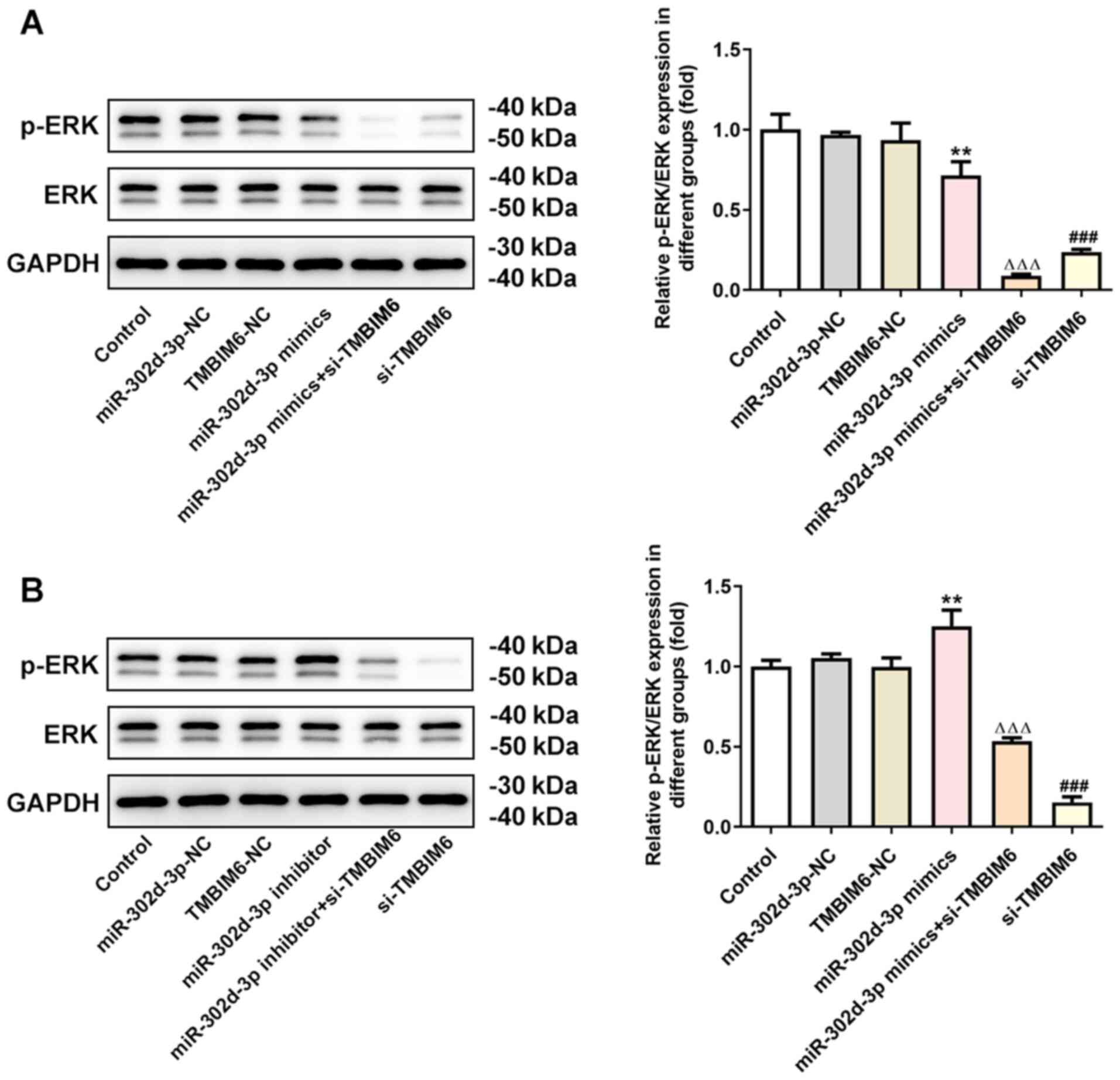|
1
|
Anastasiadi Z, Lianos GD, Ignatiadou E,
Harissis HV and Mitsis M: Breast cancer in young women: An
overview. Updates Surg. 69:313–317. 2017. View Article : Google Scholar : PubMed/NCBI
|
|
2
|
Merino Bonilla JA, Torres Tabanera M and
Ros Mendoza LH: Breast cancer in the 21st century: From early
detection to new therapies. Radiologia. 59:368–379. 2017.
View Article : Google Scholar : PubMed/NCBI
|
|
3
|
Tian Z, Tang J, Liao X, Yang Q, Wu Y and
Wu G: An immune-related prognostic signature for predicting breast
cancer recurrence. Cancer Med. 9:7672–7685. 2020. View Article : Google Scholar : PubMed/NCBI
|
|
4
|
Li Y, Huo J, Pan X, Wang C and Ma X:
MicroRNA 302b-3p/302c-3p/302d-3p inhibits epithelial-mesenchymal
transition and promotes apoptosis in human endometrial carcinoma
cells. Onco Targets Ther. 11:1275–1284. 2018. View Article : Google Scholar : PubMed/NCBI
|
|
5
|
Erratum: MicroRNA 302b-3p/302c-3p/302d-3p
inhibits epithelial-mesenchymal transition and promotes apoptosis
in human endometrial carcinoma cells [Erratum]. Onco Targets Ther.
11:22032018. View Article : Google Scholar : PubMed/NCBI
|
|
6
|
Ecevit CO, Aktas S, Tosun Yildirim H,
Demirağ B, Erbay A, Karaca İ, Çelik A, Demir AB, Erçetin AP and
Olgun N: MicroRNA-17, MicroRNA-19b, MicroRNA-146a, MicroRNA-302d
expressions in hepatoblastoma and clinical importance. J Pediatr
Hematol Oncol. 41:7–12. 2019. View Article : Google Scholar : PubMed/NCBI
|
|
7
|
Chen D and Yang H: Integrated analysis of
differentially expressed genes in breast cancer pathogenesis. Oncol
Lett. 9:2560–2566. 2015. View Article : Google Scholar : PubMed/NCBI
|
|
8
|
Livak KJ and Schmittgen TD: Analysis of
relative gene expression data using real-time quantitative PCR and
the 2(-Delta Delta C(T)) method. Methods. 25:402–408. 2001.
View Article : Google Scholar : PubMed/NCBI
|
|
9
|
Wang S, Zheng Y, Hu Z, Wang Z, Zhang Y and
Wei L: Downregulated miR302d3p promotes chondrocyte proliferation
and migration by regulation of Unc-51-like kinase 1. Int J Mol Med.
44:1039–1047. 2019.PubMed/NCBI
|
|
10
|
Xu J, Wang Y, Hua X, Xu J, Tian Z, Jin H,
Li J, Wu XR and Huang C: Inhibition of PHLPP2/cyclin D1 protein
translation contributes to the tumor suppressive effect of NFκB2
(p100). Oncotarget. 7:34112–34130. 2016. View Article : Google Scholar : PubMed/NCBI
|
|
11
|
Wang F, Yang L, Sun J, Zheng J, Shi L,
Zhang G and Cui N: Tumor suppressors microRNA-302d and microRNA-16
inhibit human glioblastoma multiforme by targeting NF-κB and FGF2.
Mol Biosyst. 13:1345–1354. 2017. View Article : Google Scholar : PubMed/NCBI
|
|
12
|
Ishikawa T, Watanabe N, Nagano M,
Kawai-Yamada M and Lam E: Bax inhibitor-1: A highly conserved
endoplasmic reticulum-resident cell death suppressor. Cell Death
Differ. 18:1271–1278. 2011. View Article : Google Scholar : PubMed/NCBI
|
|
13
|
Xu Q and Reed JC: Bax inhibitor-1, a
mammalian apoptosis suppressor identified by functional screening
in yeast. Mol Cell. 1:337–346. 1998. View Article : Google Scholar : PubMed/NCBI
|
|
14
|
Junjappa RP, Kim HK, Park SY, Bhattarai
KR, Kim KW, Soh JW, Kim HR and Chae HJ: Expression of TMBIM6 in
cancers: The involvement of Sp1 and PKC. Cancers (Basel).
11:9742019. View Article : Google Scholar : PubMed/NCBI
|
|
15
|
Lee GH, Chae HJ and Kim HR: Monoamine
carboxylate transporters are involved in BI-1-associated cancer
metastasis in HT1080 colon fibrosarcoma cells. Int J Oncol.
39:209–216. 2011.PubMed/NCBI
|
|
16
|
Li D, Wei Y, Xu S, Niu Q, Zhang M, Li S
and Jing M: A systematic review and meta-analysis of bidirectional
effect of arsenic on ERK signaling pathway. Mol Med Rep.
17:4422–4432. 2018.PubMed/NCBI
|
|
17
|
Yang C, Yu H, Chen R, Tao K, Jian L, Peng
M, Li X, Liu M and Liu S: CXCL1 stimulates migration and invasion
in ERnegative breast cancer cells via activation of the ERK/MMP2/9
signaling axis. Int J Oncol. 55:684–696. 2019.PubMed/NCBI
|
|
18
|
Sheng W, Chen C, Dong M, Wang G, Zhou J,
Song H, Li Y, Zhang J and Ding S: Calreticulin promotes EGF-induced
EMT in pancreatic cancer cells via Integrin/EGFR-ERK/MAPK signaling
pathway. Cell Death Dis. 8:e31472017. View Article : Google Scholar : PubMed/NCBI
|
|
19
|
Maehara O, Suda G, Natsuizaka M, Ohnishi
S, Komatsu Y, Sato F, Nakai M, Sho T, Morikawa K, Ogawa K, et al:
Fibroblast growth factor-2-mediated FGFR/Erk signaling supports
maintenance of cancer stem-like cells in esophageal squamous cell
carcinoma. Carcinogenesis. 38:1073–1083. 2017. View Article : Google Scholar : PubMed/NCBI
|
|
20
|
Buffet C, Hecale-Perlemoine K, Bricaire L,
Dumont F, Baudry C, Tissier F, Bertherat J, Cochand-Priollet B,
Raffin-Sanson ML, Cormier F and Groussin L: DUSP5 and DUSP6, two
ERK specific phosphatases, are markers of a higher MAPK signaling
activation in BRAF mutated thyroid cancers. PLoS One.
12:e01848612017. View Article : Google Scholar : PubMed/NCBI
|
|
21
|
Zhao L, Wang Y, Jiang L, He M, Bai X, Yu L
and Wei M: MiR-302a/b/c/d cooperatively sensitizes breast cancer
cells to adriamycin via suppressing P-glycoprotein(P-gp) by
targeting MAP/ERK kinase kinase 1 (MEKK1). J Exp Clin Cancer Res.
35:252016. View Article : Google Scholar : PubMed/NCBI
|
|
22
|
Kim JH, Lee ER, Jeon K, Choi HY, Lim H,
Kim SJ, Chae HJ, Park SH, Kim S, Seo YR, et al: Role of BI-1
(TEGT)-mediated ERK1/2 activation in mitochondria-mediated
apoptosis and splenomegaly in BI-1 transgenic mice. Biochim Biophys
Acta. 1823:876–888. 2012. View Article : Google Scholar : PubMed/NCBI
|























